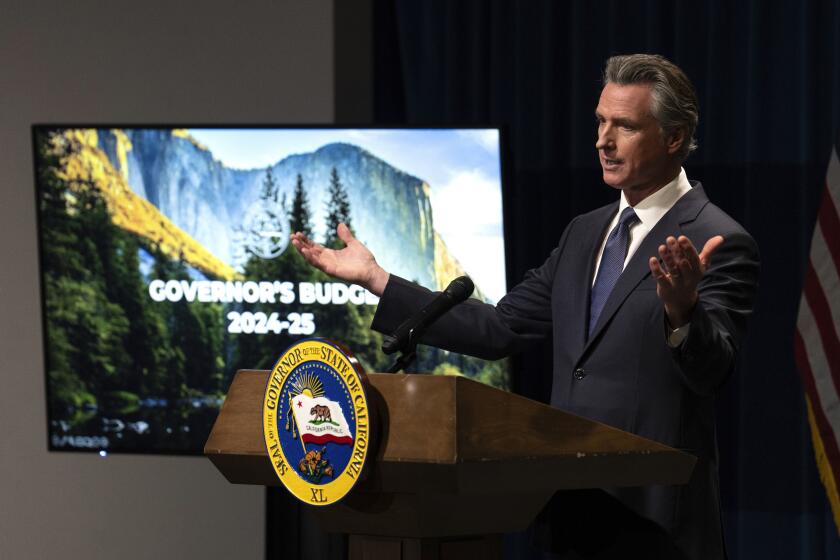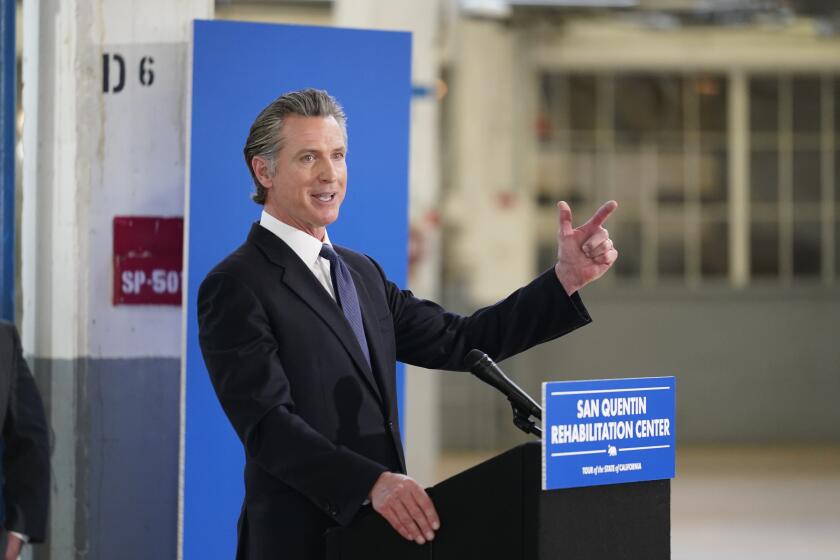Voters say California’s budget deficit is an ‘extremely serious’ problem, poll finds

- Share via
Half of California registered voters consider the state budget deficit an “extremely serious” problem, and 57% believe the state is headed in the wrong direction, according to a new UC Berkeley Institute of Governmental Studies poll co-sponsored by the Los Angeles Times.
The survey was conducted days before Gov. Gavin Newsom unveiled an outline of his $291.5-billion spending plan for the next fiscal year and plans to address the $37.9-billion deficit projected by his administration. However grim, Newsom’s shortfall estimate is rosier than a December projection from the Legislative Analyst’s Office of a $68-billion budget hole.
“Voters are concerned about it, and they’re going to hold it against the governor and the Legislature to do something about it,” said Mark DiCamillo, director of the Berkeley poll and a longtime California pollster.
The state budget relies heavily on capital gains taxes paid by California’s highest earners, making state revenues prone to volatility in the stock market.
Lower-than-expected revenues, delayed tax deadlines and overspending based on inaccurate budget projections created California’s grim financial picture.
The governor’s proposed solution includes declaring a budget emergency to dip into the state’s rainy day reserves; cutting $8.5 billion in spending from programs that support climate change efforts, housing and other services; and reconsidering a minimum wage increase for healthcare workers.
With weaker revenues than expected, Gov. Gavin Newsom wants to declare a budget emergency and ask California lawmakers to dip into the state’s reserves.
When asked how they think California should offset the deficit, a majority of voters, 51%, support cuts to government services, and 35% want to use the rainy day fund. Among less popular savings measures, 17% of voters want to borrow from special funds.
The governor and voters appear in agreement in their opposition to raising taxes, which only 13% backed in the Berkeley poll.
California Assembly member Alex Lee (D-San Jose) has proposed raising taxes under his proposed Wealth Tax Act, which would impose a 1.5% tax on net worth above $1 billion in 2024 and 2025; and a 1% tax on net worth exceeding $50 million and an additional 0.5% tax on net worth over $1 billion as of 2026.
The governor has repeatedly rejected the idea of raising state taxes to offset the deficit.
Support for taxes on the wealthy have laid the foundation for California’s progressive tax structure, which leads to the state’s wild revenue swings, DiCamillo said.
The governor’s popularity has tumbled this year as he’s amplified his role in national politics and campaigned outside of California.
Newsom’s 46% approval rating in the January poll remains largely unchanged from late October when voters gave him historic low marks. The latest poll found that 47% disapprove of his job performance as governor. Newsom terms out of office in 2026, so he doesn’t have a reelection to worry about.
The shortfall creates a new political dilemma for Newsom as he’s forced to make difficult spending decisions during budget negotiations with lawmakers over the next few months that could frustrate his allies and voters.
Environmental groups pushed back on the governor’s nearly $3 billion in proposed cuts for climate change programs. Other groups, such as the County Welfare Directors Assn., were concerned about reductions in funding for social services.
Overall, voters demonstrated little confidence in the direction of the state: 57% said California is headed the wrong way and only one-third said things are going right, the poll found.
The Berkeley IGS poll was conducted online Jan. 4-8 among a random sample of 8,199 registered California voters, including a weighted sub-sample of 4,470 voters likely to take part in the March 5 primary.
The results were weighted to match census and voter registration benchmarks, so estimates of the margin of error may be imprecise. The results have an estimated margin of error of 1.5 percentage points in either direction for the full sample.
More to Read
Get the L.A. Times Politics newsletter
Deeply reported insights into legislation, politics and policy from Sacramento, Washington and beyond. In your inbox three times per week.
You may occasionally receive promotional content from the Los Angeles Times.













